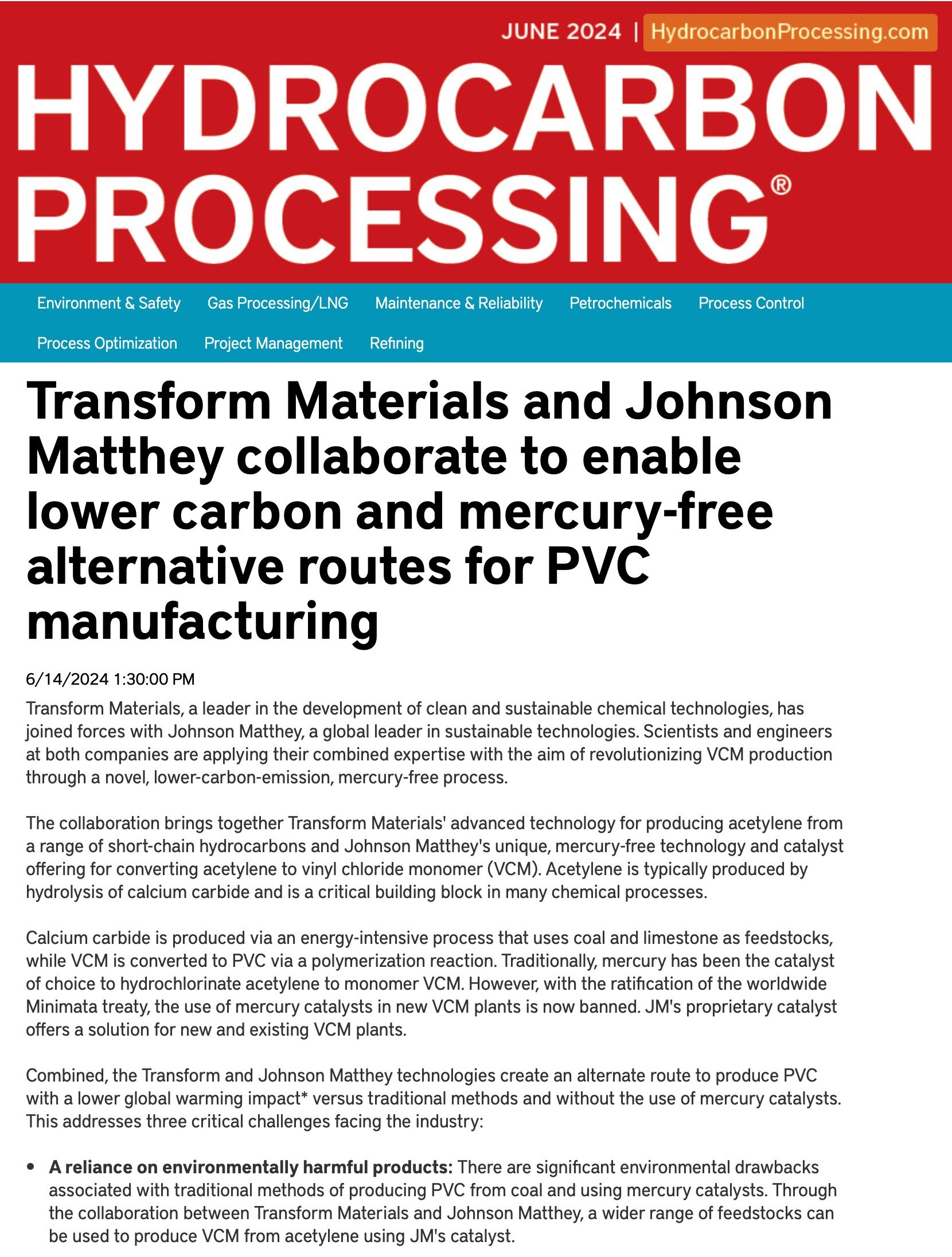Case study: transforming the narrative on PVC production
How ZingPR’s targeted media outreach amplified a sustainable innovation
Transform Materials, a Florida-based startup, has developed a game-changing microwave plasma technology that converts hydrocarbons into clean acetylene and hydrogen without producing any carbon dioxide (CO2) emissions. This innovation addresses the significant environmental concerns associated with traditional acetylene production methods, offering a cleaner and more efficient pathway for manufacturing polyvinyl chloride (PVC)—a ubiquitous plastic used in countless applications.
Recognizing the potential of this breakthrough, Johnson Matthey, a global leader in sustainable technologies, formed a strategic partnership with Transform Materials. This collaboration was a natural fit, aligning perfectly with Johnson Matthey's commitment to developing environmentally responsible solutions. Transform Materials' ability to produce clean acetylene without CO2 emissions complements Johnson Matthey's existing mercury-free catalyst technology for converting acetylene to VCM (vinyl chloride monomer), the key building block of PVC. Together, they offer a complete, greener solution for PVC manufacturers, strengthening Johnson Matthey's portfolio and expanding its reach into new markets by enabling the use of diverse hydrocarbon feedstocks.
The Challenge: A Strategic Communications Approach for a Deeptech Startup
To maximize the impact of this groundbreaking collaboration, Transform Materials turned to ZingPR to strategically announce the partnership and secure coverage across relevant industries. TThe challenge was two-fold: effectively communicate the complex technical details of the technology and highlight its far-reaching benefits for the energy, chemicals, and hydrogen sectors.
The ZingPR Strategy: Targeted Media Outreach for Maximum Impact
We implemented a multi-faceted media outreach strategy designed to:
Craft a compelling story: ZingPR worked closely with Transform Materials to distill the technical details into a clear and impactful narrative, emphasizing the environmental benefits, scalability, and industry-leading expertise involved.
Targeted pitching: ZingPR identified key trade publications across the energy, chemicals, and hydrogen sectors and tailored our pitches to showcase the specific implications and opportunities the announcement held for each audience..
Relationship building: we leveraged existing relationships and established new connections with journalists and editors to ensure maximum visibility.
Exclusive access: ZingPR offered journalists exclusive interviews with company leadership, providing in-depth insights and personalized stories to enhance coverage.
By combining innovative technology with a strategic public relations approach, Transform Materials and ZingPR successfully positioned the company as a leader in sustainable PVC production, paving the way for a greener future in the plastics industry and demonstrating the power of effective B2B PR for deeptech startups.
Results
Our targeted outreach campaign generated significant media coverage across multiple industry trade publications, including:
This case study demonstrates the power of a well-crafted PR strategy in driving visibility, establishing industry leadership, and creating lasting impact for innovative companies in the sustainability sector. If your deeptech or industrial startup is looking to amplify its message and make a meaningful difference in the world, ZingPR can help you create a tailored media relations strategy that delivers results. Contact us today to learn more about how we can elevate your brand and showcase your commitment to a sustainable future.






